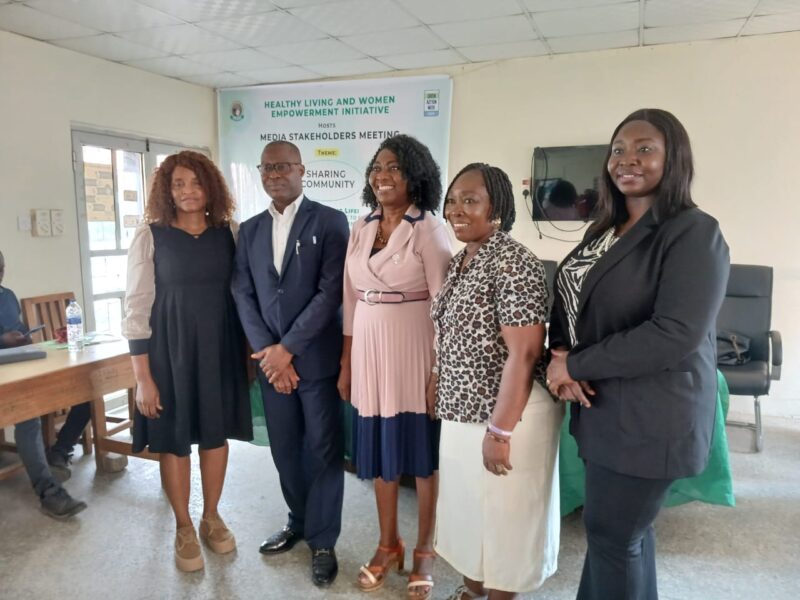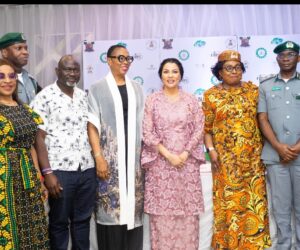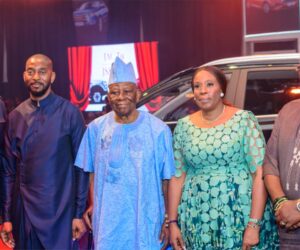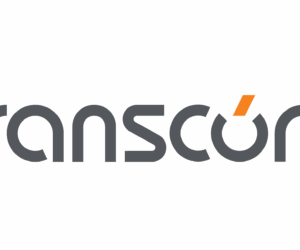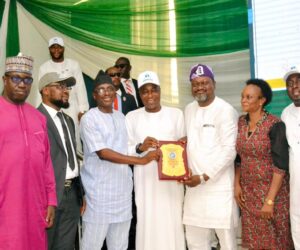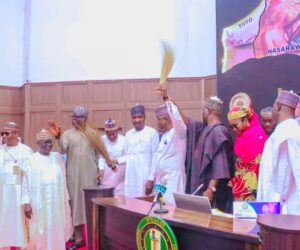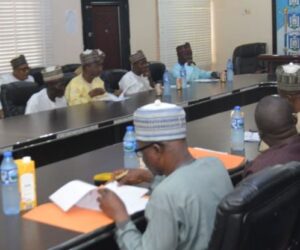1
… Seeks Inclusion Of Gender-Sensitive Public Toilets, Functional Water Points, Safe Handwashing Stations
Lagos – Healthy Living and Women Empowerment Initiative (HELWEI) has decried Nigeria’s worsening sanitation crisis in traditional markets, urging Governments to urgently allocate and release dedicated budget lines for improved Water, Sanitation and Hygiene (WASH) infrastructure nationwide.
Making the appeal was Eberechukwu Okey-Onyema, the Executive Director of the Healthy Living and Women Empowerment Initiative (HELWEI), during a one-day media stakeholders’ meeting held in Lagos to commemorate Green Action Week 2025.
Specifically, Okey-Onyema raised the alarm over the poor conditions in Nigeria’s public markets, which serve millions of citizens each day.
She demanded the inclusion of gender-sensitive public toilets, functional water points, safe handwashing stations and structured waste disposal systems in market infrastructure, stating unequivocally that “market vendors and consumers deserve clean, dignified spaces that support health safety and economic activity.”

Institutional Failure And Fragmentation
She further called for institutionalised collaboration between key ministries—including Environment, Health, Agriculture, Primary Health Care Board, Information and Strategy, and Local Government, Community Affairs and Rural Development—to harmonise standards, share data and jointly monitor hygiene compliance across markets. “There should be clear, institutionalised collaboration,” she stated, emphasising that fragmented efforts and siloed governance have only worsened the crisis.
Okey-Onyema also urged development partners, NGOs and market unions to invest in continuous, community-driven Behaviour Change Communication (BCC) strategies. These strategies, she said, must be delivered in local languages and through culturally relevant platforms to empower traders, consumers and environmental workers to adopt hygiene-conscious behaviours.
Enforcement, Not Empty Promises
In a sharp critique of regulatory laxity, she declared, “It is not enough to set standards. Markets should be regularly inspected and compliance enforced.” She demanded that environmental health officers and market supervisors be equipped, trained and supported to carry out regular WASH audits, enforce regulations and shut down high-risk areas until remedial actions are taken. Market access, she insisted, must be conditional on meeting a minimum threshold of hygiene compliance.
Media’s Role In Driving Accountability
Describing the media as “drivers and narrative shapers,” the HELWEI boss called on journalists to become champions for safer markets and healthier communities. “The media must continue to spotlight poor sanitation, amplify community voices and set an agenda for duty-bearers to act,” she said. Through investigative reporting, citizen storytelling, radio programming and data journalism, the media has the power to shift public opinion and drive systemic change.
WASH NORMS 2024: A Grim Reality
Quoting the Water, Sanitation, Hygiene National Outcomes Routine Report (WASH NORMS) 2024, Okey-Onyema revealed that access to basic WASH services in Nigeria remains at a dismal 17 percent. Even more alarming, only 4 percent of public parks and traditional markets—critical food sources for millions—are equipped with basic water and sanitation infrastructure.
“In these same markets, food is prepared, sold, handled—and contaminated. This directly endangers millions,” she warned.
Need For Strategic Action On Lagos State’s Water, Sanitation Gaps
Okey-Onyema drew attention to areas of concern within Lagos State’s water and sanitation systems. With a daily demand of 720 million gallons per day (MGD), the state’s installed water production capacity stands at a mere 210 MGD—leaving a staggering deficit of over 500 MGD. Only 10 percent of the population has access to public water supply, and just 24 percent have access to basic sanitation.
The consequences are catastrophic. Over 70,000 children under five die annually from water-borne diseases. In 2021, Nigeria recorded 111,062 cholera cases and 3,604 deaths. Water-borne diseases account for 9.77 percent of total deaths in Nigeria, with 144,724 diarrhoea-related deaths reported in 2020.
“To address these issues, there are 51 mini and micro waterworks in Lagos State, but more needs to be done to bridge the gap in water supply and sanitation services,” she added.
Kick Dirt, Hug Life: A Community-Led Solution
During the meeting, Okey-Onyema announced HELWEI’s proposed project titled, Kick Dirt, Hug Life, to be implemented in partnership with the Civil Society Scaling Up Nutrition (CS-SUNN) as part of Green Action Week 2025 under the theme “Sharing Community.” The initiative aims to promote community resilience in environmental protection, nutrition and hygiene, particularly in peri-urban communities in Alimosho Local Government Area.
She said, “The ‘Kick Dirt, Hug Life,’ campaign is not just a call to action; it is a community-based movement that seeks to protect consumers, elevate hygiene consciousness and strengthen the health systems from the ground up. It draws a direct link between sanitation and nutrition, markets and mortality and citizen engagement/public accountability.
“This initiative is directly contributing to Nigeria’s progress on several Sustainable Development Goals (SDGs), reinforcing the interconnectedness of environmental health, food systems and community resilience.
“Through its focus on market hygiene, nutrition-sensitive WASH interventions and citizen-led advocacy, HELWEI’s campaign advances efforts toward Goal 2 (Zero Hunger), Goal 3 (Good Health and Wellbeing), Goal 6 (Clean Water and Sanitation), Goal 11 (Sustainable Cities and Communities), and Goal 13 (Climate Action)—demonstrating that bold local action can accelerate global commitments.
“This strategic Media Stakeholders Roundtable in Lagos as part of the Green Action Week 2025 Campaign – ‘Kick Dirt, Hug Life’ has provided us a platform to reflect on the growing intersections between environmental degradation, nutrition insecurity and poor sanitation in Lagos – particularly within traditional market spaces. Leading voices across government agencies, civil society, the media, nutrition coalitions and WASH-focused development organisations have reinforced a collective commitment to amplifying the campaign’s core messages and strengthening the role of the media in promoting behavioural change, community accountability and increased visibility on the state of market hygiene and food safety.
HELWEI is optimistic that the actionable recommendations generated from the roundtable—ranging from enhanced policy prioritisation to improved coordination among stakeholders—will be implemented in the coming months.
“In the coming days, we will host a Community Dialogue, where market women, Community Development Associations (CDAs), market leaders and environmental officials will engage in solution-driven conversations. These dialogues will elevate the voices of those most affected – persons with disability(PWDs) and women who prepare the food, trade the goods and nurse the children most exposed to the consequences of environmental neglect.
“The third phase—a high-energy Road Walk, will serve as a citizen-led mass mobilization effort to draw attention to the worsening sanitation crisis in Lagos markets and to demand concrete government action. Participants will don branded campaign gear and distribute multilingual information, education and communication (IEC) materials across markets in Lagos,” Okey-Onyema added.
Professor Modupe Akinyinka, represented by Public Health Physician Aderinsola Anifowose, echoed the urgency of the crisis. She called for sustained collaboration between government, media, NGOs and the Ministry of Health, stating, “We need to improve the health system in our local communities.”
Citizen-Led Engagement On Sanitation
The event concluded with a powerful panel session themed, “The Role of the Media Towards Raising Collective Action for Enhanced Food Safety in Local Markets in Lagos State and Promotion of Citizen-Led Engagement on Sanitation, Hygiene and Nutrition.” Nigeria’s sanitation crisis is a ticking time bomb, and the time for decisive, coordinated action is now, the panelists stressed.
PHOTO CAPTION: Right to Left: Mrs. Nkeoma Abarikwu, Board Chairperson, HELWEI Nigeria; Mr. Zebulon Agu, Editor, Business Day; Mrs. Ebere Okey-Onyema, Executive Director, Healthy Living and Women Empowerment; Lady Vickie Urenma Onyekuru and Dr Aderinsola Anifowose, Public Health Physician, Association of Public Health Physician of Nigeria (APHPN)- Lagos State Chapter, representing Professor Modupe Akinyinka of the Lagos Community Health and Primary Health Care department, during the during a one-day media stakeholders’ meeting organised by the Healthy Living and Women Empowerment Initiative (HELWEI), in Lagos to commemorate Green Action Week 2025.

